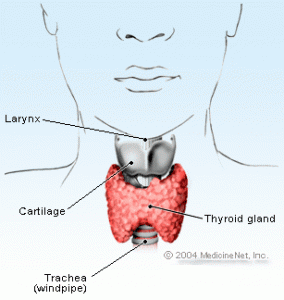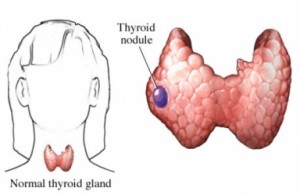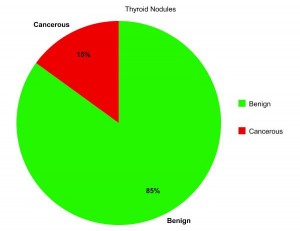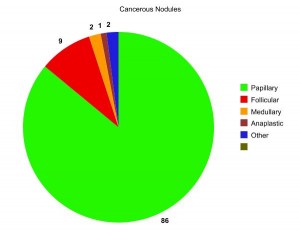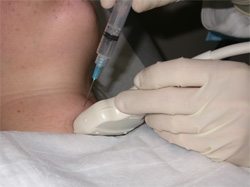A thyroid nodule is a lump which grows inside an otherwise normal thyroid gland. You can have one or many nodules within your thyroid gland.
First, lets talk about some basics of where your thyroid gland is and what it does. The thyroid gland sits in your lower neck, just above your sternum. It consists of a thin bridge of tissue over your windpipe that connects two lobes on either side of the windpipe. Most normal-sized thyroid glands are difficult to feel through the skin.
The purpose of your thyroid gland is to make thyroid hormone, a chemical that circulates through your body and controls your metabolism. If your thyroid gland makes too much thyroid hormone, you will lose weight, have too much energy, and many other problems. If your thyroid makes too little hormone, you’ll gain weight, feel fatigued, and have other problems. Usually problems with too much or too little thyroid hormone are treated with medications.
So, back to thyroid nodules. If nodules become large enough, they can be felt through the skin. This is how some nodules are discovered. Many nodules are discovered through radiologic studies, usually ultrasound tests or CT scans. These imaging studies are sometimes ordered because of low or high thyroid hormone levels, but sometimes for entirely different reasons (like difficulty swallowing, neck pain, etc).
Well, so you’ve had an ultrasound or another imaging study, and it shows that you have one or more nodules in your thyroid gland. Should you be worried? The answer is… maybe, but probably not.
Let’s look at the numbers: of all thyroid nodules, 80-90% are benign. That means about 10-20% will be cancerous.
Of the cancerous nodules, almost all of them are known as “well-differentiated thyroid cancers.” These include papillary cancer (86%) and follicular cancer (9%). The remaining 5% of thyroid cancers include medullary (2%), anaplastic (1%), and various others (2%).
Compared to cancers in other parts of the body, most thyroid cancers have an excellent prognosis. Cure rates exceed 90% for papillary and follicular cancers. I always tell patients diagnosed with papillary cancer of a story from my medical school days. When I was a second year med student listening to a lecture on thyroid cancer, the professor told us that if he had to pick a cancer to have, he would pick papillary thyroid cancer because it carries such a good prognosis.
So, what happens if you are discovered to have a thyroid nodule or multiple nodules? The first thing to consider is how large are the nodules. If a nodule is less than 1 centimeter in size, it is too small to be reliably sampled with a needle biopsy. For these very small nodules, I will wait 6 months and repeat the ultrasound to see if the nodule is changing or growing.
For nodules larger than 1 cm, I will order a needle biopsy (called a fine needle aspirate or “FNA”). This test is performed by the radiologist using the ultrasound for guidance. For patients with multiple nodules, the largest 1 or 2 nodules are usually sampled.
The needle biopsy is overall very reliable but not 100%. Most possibilities are diagnosed by the needle results alone. Usually benign nodules and papillary cancer can be easily distinguished based on the needle biopsy. Follicular cancers can be difficult or impossible to diagnose based on needle results alone. Needle biopsies that suggest follicular nodules usually require surgery for definitive diagnosis.
Finally, what do I recommend for treatment of thyroid nodules?
For benign nodules, they can usually be monitored with ultrasounds every 6-12 months to look for any growth in the nodules. If the benign nodules are large enough to cause symptoms (usually from compression of the esophagus and windpipe) the thyroid can be removed.
For cancerous nodules, the treatment is removal of the entire thyroid gland and (usually) treatment with radioactive iodine about 2 months after surgery. The radioiodine treatment is coordinated by an endocrinologist. I will generally refer you to an endocrinologist before your surgery if you don’t see one already.
So, to wrap up: should you be worried if you have a thyroid nodule? Maybe a little, but I wouldn’t lose any sleep over it. Fortunately, by the law of averages you have a greater than 95% chance of having a benign growth or a very treatable cancer.
